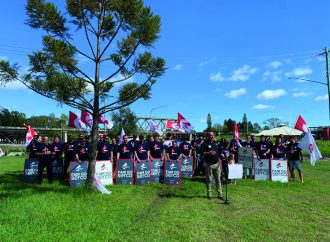Some functions must remain with the state.
The care of traumatised, abused children should not be left to the mercy of market forces.
Reckon this sounds self-evident? Well, welcome to NSW.
The privatisation frenzy of the past 30 years has left few of us unburned. We drive on privatised roads, power our homes with privatised electricity, and send our prisoners to privatised gaols.
If there’s one group in the state that’s been more egregiously hurt by privatisation than any other it’s vulnerable children.
Every year thousands of children across NSW regrettably have to be removed from their homes, because they have been assessed as being at serious risk of harm.
Once the authorities get them out of immediate danger, the job is to place them with foster carers on a short-, medium-, or long-term basis.
Obviously recruiting, training, and supporting enough foster carers is a difficult job. Twenty years ago, this challenge was coordinated by what is now the Department of Communities and Justice. The Department was funded to develop this pool of foster carers itself and also to work with non-government organisations (NGOs) in the sector who might also be able to assist. For example, Indigenous-led NGOs might be enlisted by the Department to help coordinate a pool of culturally appropriate carers for Indigenous children.
Yet under the Carr-Iemma-Rees- Keneallly Government the Department was disempowered and funding was redirected to a patchwork of privately run organisations, each bidding for the government contract as aggressively as they could.
The O’Farrell-Baird-Berejiklian-Perrottet Government ramped up this privatisation process with predictable enthusiasm.
The result? The foster carer pool in NSW has now evaporated into a bunch of disconnected, shallow puddles. Predictably, private providers were never able to develop the capacity for the complexity or the sheer volume of children in out-of-home care. Today, every time an at-risk child is removed from their home there is only a chance they will be placed with a foster home. The rest end up in shabby hotels, supervised by casualised agency staff.
Several years ago, when there was public outrage about the practice of sticking vulnerable kids into cheap hotels, any sensible, reasonable government would have realised the privatisation error. They would have started taking steps to reverse the process. They would have recentralised the coordination of foster carers.
The Coalition government, however, decided to spin their way out of trouble. They instructed the department to start relabelling cheap hotels as Alternative Care Arrangements (ACAs). ACAs were then embedded into standard practice and their management was – you guessed it – outsourced to the private sector.
Not only are ACAs a shockingly poor option for the welfare of vulnerable children, they constitute a shockingly expensive option for the taxpayer, too. The average ACA is estimated to cost the NSW taxpayer an incredible $1.7 million per year, per kid. Our union has been told of some that have cost double that.
To be clear, when the foster care pool was managed by the public sector, ACAs didn’t have to exist at all. But now we have a cost blowout to the system of hundreds of millions of dollars every year.
The reality is we have to resocialise the provision of foster care in NSW.
The new Minister for Community Services, Kate Washington, is passionate about improving child protection. Her Government was elected on a loud and proud anti-privatisation platform. So she should have the moral and political authority to pull the big levers necessary.
Our members in Child Protection have to confront things every day few of us could handle. The decision to remove a child from their home is never, ever an easy one. The very least the Government can do is guarantee that when our members are forced to remove a child from their family unit, that they do not have to consider the possibility they may be moving them somewhere worse.
An edited version of this article appeared in
The Sunday Telegraph on 10 September 2023.



















Leave a Comment
Your email address will not be published. Required fields are marked with *